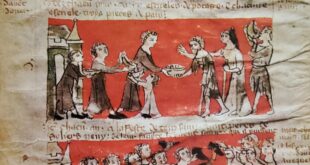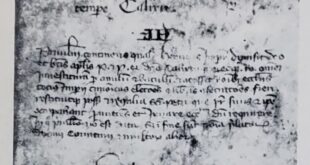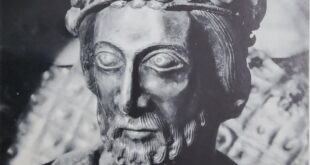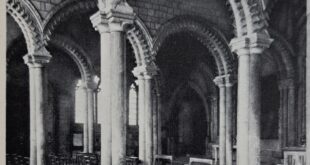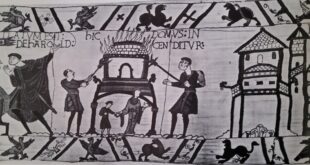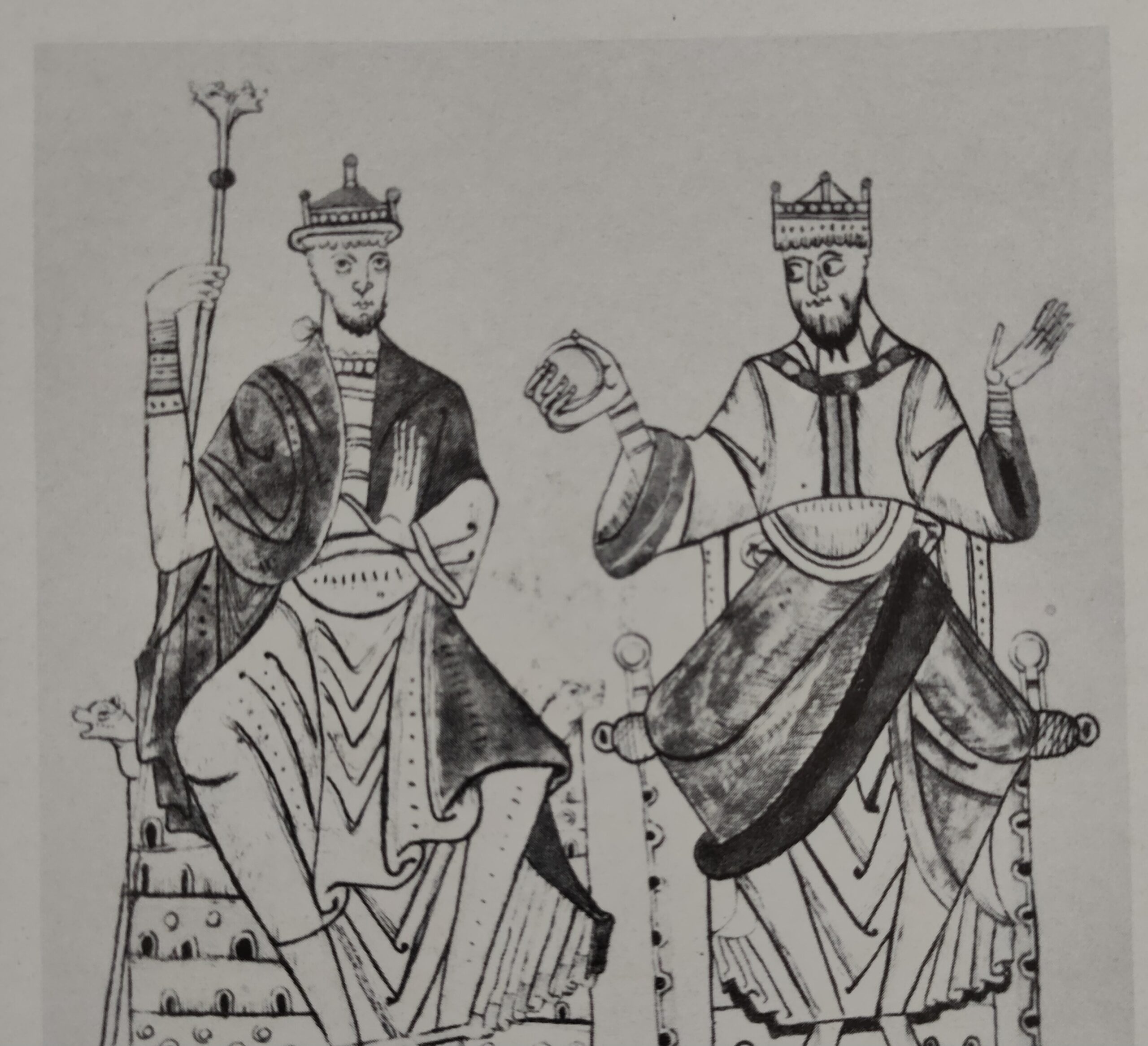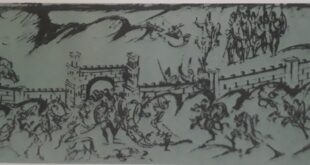Southern France, the cult of courtly love, takes root and flourishes. In the glories of its new cathedral, the town of Chartres provided the fullest single expression of vigour and inspiration of twelfth-century Europe. The school of Chartres itself had been in the forefront of the revival of Neoplatonist philosophy that marked the intellectual ferment of that glorious century. Like other important centres, it had been receptive to the intellectual stimulus provided by that century’s full discovery of Greco-Arab learning. The Glory of Chartres Chartres also symbolized the cultural and political hegemony that northern France was to exercise throughout Europe …
Read More »A. D.
Abelard in Paris (1100 A. D.)
Abelard, Peter – a renowned teacher from Paris, surrounded by a group of questioning students – formed the nucleus of the new universities. Through the early Middle Ages, such teaching and studying, as existed in Europe, was centered on monasteries and cathedral schools – Theology, was the “queen of sciences”. The new universities that sprang up across Europe in the twelfth and thirteenth centuries made it possible for other branches of learning to flourish and develop. The dialectical methods introduced by Abelard were to have a profound influence on the thinking of his day and brought him into conflict with …
Read More »Toledo falls, marking the end of Islam in Spain (1077 – 1100)
Toledo falls and this marks the beginning of the end of Islam in Spain. A triumph for orthodoxy The events at Canossa and the condemnation of Peter Abelard under the auspices of St. Bernard of Clairvaux, were signal triumphs for the papacy and the orthodox doctrincs of Western Christianity. The capture of Jerusalem by the First Crusade, on the other hand, was an exhilarating achievement for European Christendom as a whole. Yet, during these sixty-three years, new forces emerged, forces that led to questions about the spiritual status of the ecclesiastical hierarchy and even about the fundamental doctrines of the …
Read More »Henry IV, Humiliation at Canossa (1077 A. D.)
Henry IV stood barefoot in the snow, for three days in January, 1077, outside Canossa castle, waiting to see Pope Gregory VIl and to beg him to lift the dreaded sentence of excommunication. Henry’s action was the culmination of a conflict between Church and State that had been brewing for centuries. Medieval rulers had come to regard their bishops merely as feudal nobles who were expected to fill their proper roles in the functioning of their kingdoms, but some of the clergy wished to emphasize the religious office of bishops by removing them from the responsibilities and the privileges, of …
Read More »Pope Leo IX (1066 – 1077)
Galilee Chapel in Durham Cathedral. Durham was the greatest of the Norman ecclesiastical border fortress in the north of England.
Read More »William of Normandy, the Conqueror (1066 A. D.)
William of Normandy, the conqueror, was also descended from English kings and was convinced that King Edward had promised him the succession. The disputed succession following the death of King Edward the Confessor, brought new invasions and new wars to England. Then two great battles fought in the fall of 1066, decided the country’s future. At Stamford Bridge, Harold, King of England, defeated his cousin and namesake Harold of Norway. His joy was short-lived; immediately after the battle, King Harold learnt that another cousin and claimant to the throne, William of Normandy, had crossed the Channel from France and had …
Read More »Hugh Capet (982 – 1066 A. D.)
Hugh Capet was coronated in 987 and with that, began the French dominance of Europe. During the eleventh century, a view of world history is dominated by the splendours of the Sung empire in China. Founded in the last decades of the previous century, it reached a peak during the eleventh century and that entitles it to be regarded as one of the most brilliant epochs, in the history of civilization. The European stage, is commanded by the prestige and apparent power of the German empire, founded by Otto I and ruled over by his descendants. Both the ambitions of …
Read More »Norsemen and Vikings (982 A. D.)
Norsemen or Vikings – Danes, Norwegians and Swedes — were terrorizing the greater part of Europe, over a thousand years ago. Their earliest activities were chiefly limited to raiding and destroying; occupations for which their mastery of the sea admirably suited them. In time, they came to settle down — in the British Isles, in Iceland and in Greenland. It was this last, snow-covered and icebound land that was first colonized by Eric the Red — a man so named because of the colour of his hair, his fiery temper and murderous blood on his hands. Eric’s son Leif, introduced …
Read More »Sung Dynasty, Golden Age of Artistic Achievement (955-982 A. D.)
The birth of Hungary The battle of the Lechfeld, which was so important to Western Europe, had an equally profound influence on events in Central and Eastern Europe. The almost total annihilation of their army compelled the Magyars to settle in their new home on the Hungarian plains and within sixty years they had embraced Christianity. Under King Stephen I (997-1038) , who was later canonized, they accepted Christianity from Rome, a process that had been began by Stephen’s father, Duke Geza. The new king accepted not only religion but also his royal title and crown from Pope Sylvester II. …
Read More »Lechfeld (955 A. D.)
Lechfeld, the battleground outside Augsburg on St. Lawrence’s day, 10 August 955 A. D., was highly significant for the whole of Europe. On a battlefield littered with corpses and discarded weapons, the victorious Otto I, had his cheering troops proclaim him Emperor. Germany had been close to civil war and rebellious nobles had allied themselves with the barbarian Magyars, who were intent on destroying what passed for civilzation in tenth-century Germany. It was Otto’s achievement to unite the Germans against both the rebels and the invading Magyars. His new “Roman” Empire differed from the old in its strongly Christian character. …
Read More »
